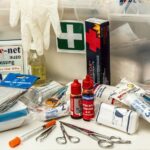Thecoli (Escherichiacoli) is a type of bacteria that lives in your intestines. It can also be found in the stomach of certain animals.
The majority of thecoli strains are safe and can help maintain a healthy digestive system. However, some strains can cause diarrhea when you consume contaminated food and drink fouled water.
Thecoli is Responsible
Although we often associate thecoli with food poisoning and pneumonia, there are other types of bacteria that can cause infections such as urinary tract infections and pneumonia.It is responsible for 75% to 95% in urinary tract infections. E.coli is a common bowel resident, and it is what makes it to the urinary tract.
Certain varieties can make you sick with a toxin called Shiga. This toxin can cause damage to your intestinal lining. STEC is an abbreviation for Shiga toxin-producing Thecoli.
O157:H7 is a particularly dangerous strain paradise biryani that can make you very sick. It can cause bloody diarrhea, vomiting, abdominal cramps, and vomiting. It is the most common cause of acute renal failure in children. It can also lead to life-threatening symptoms like:
Kidney Failure in Adult
- Fever
- Bleeding
- Confusion
- Seizures
If you experience any of these symptoms, it is important to seek emergency medical attention immediately.
How can you get infected?
Even a small amount can cause infection. This can happen in many ways:
Ground meat: This is ground meat that contains thecoli. The meat was not cooked sufficiently to kill the bacteria. Sometimes bacteria from the animals’ intestines can make its way into meat after it is processed. Ground meat is more susceptible to this because it comes form more than one animal.
Unpasteurized milk: This is milk that has not been heated to kill bacteria. The milk can contain the bacteria from the cow’s milking equipment or the cow’s udder.
Fresh vegetables and fruits: It is possible to eat fresh produce or fruit that has been contaminated with bacteria. This is most common when the water supply contains manure from nearby animals.
Other foods and beverages:It can also be found in unpasteurized fruit juices, yogurt, and raw milk cheeses.
- Water: When you swim in a lake, pool, or pond, water may be swallowed that contains thecoli.
- Others: It is possible to get thecoli from someone else, such as a child. If you wash your hands after someone with the bacteria, you can pass it on to others.
- Animals: You can find them at petting zoos and animal exhibits at fairs.
It is possible to contaminate food in your kitchen by allowing a knife or cuttingboard that has touched raw meat (like chicken) and food that will be eaten raw (like salad) to come in contact.
Treatments
Sending a stool sample to a laboratory to be tested.It is the only way to tell if you have it.
The infection will usually go away by itself, fortunately
Antibiotics may be prescribed for diarrhea caused by E.coli, such as watery travelers’ diarrhea. They can reduce symptoms but are not recommended for severe cases.
Antibiotics should be avoided if you have fever, bloody diarrhea, or if your doctor suspects that Shiga Toxin-producing Thecoli is present.They can increase your Shiga toxin production and make your symptoms worse.





